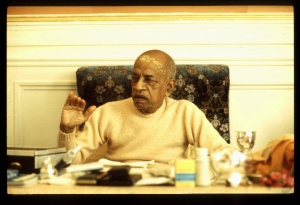SB 6.16.7

A.C. Bhaktivedanta Swami Prabhupada
TEXT 7
- nityasyārthasya sambandho
- hy anityo dṛśyate nṛṣu
- yāvad yasya hi sambandho
- mamatvaṁ tāvad eva hi
SYNONYMS
nityasya—of the eternal; arthasya—thing; sambandhaḥ—relationship; hi—indeed; anityaḥ—temporary; dṛśyate—is seen; nṛṣu—in human society; yāvat—as long as; yasya—of whom; hi—indeed; sambandhaḥ—relationship; mamatvam—ownership; tāvat—that long; eva—indeed; hi—certainly.
TRANSLATION
A few living entities are born in the human species, and others are born as animals. Although both are living entities, their relationships are impermanent. An animal may remain in the custody of a human being for some time, and then the same animal may be transferred to the possession of other human beings. As soon as the animal goes away, the former proprietor no longer has a sense of ownership. As long as the animal is in his possession he certainly has an affinity for it, but as soon as the animal is sold, the affinity is lost.
PURPORT
Aside from the fact that the soul transmigrates from one body to another, even in this life the relationships between living entities are impermanent, as exemplified in this verse. The son of Citraketu was named Harṣaśoka, or "jubilation and lamentation." The living entity is certainly eternal, but because he is covered by a temporary dress, the body, his eternity is not observed. Dehino 'smin yathā dehe kaumāraṁ yauvanaṁ jarā: (BG 2.13) "The embodied soul continually passes, in this body, from boyhood to youth to old age." Thus the bodily dress is impermanent. The living entity, however, is permanent. As an animal is transferred from one owner to another, the living entity who was the son of Citraketu lived as his son for some time, but as soon as he was transferred to another body, the affectionate relationship was broken. As stated in the example given in the previous verse, when one has a commodity in his hands he considers it his, but as soon as it is transferred it becomes someone else's commodity. Then one no longer has a relationship with it; he has no affection for it, nor does he lament for it.